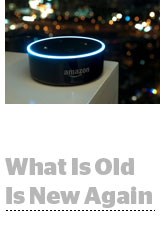 Here’s today’s AdExchanger.com news round-up… Want it by email? Sign up here.
Here’s today’s AdExchanger.com news round-up… Want it by email? Sign up here.
Alexa, Buy Me An Ad
The industry has long been hoping for a contender to the duopoly, and many believe that company is Amazon. The ecommerce giant, which has made its ambitions in advertising clear, has broadened into home devices, search (where the giant is stealing market share from Google) and over-the-top video. It’s wooing brands with the promise of third-party verification in a brand-safe environment. But questions linger for publishers whether the platform’s push into sell-side tech will cut into their revenue. “Will Amazon reignite the arbitrage model in a massive way?” James Bourner, global head of display at Jellyfish, tells Digiday. “I would have zero doubt that they would be amazing at putting their computing and data might to work at being able to buy impressions through their bidder at the cheapest possible price.” More at Digiday.
Trust Factor
Not all consumers despise advertising – when brands play by their rules. A 400-participant Northwestern University study on consumer skepticism revealed that consumers think most forms of modern advertising are actually “credible,” “fair” and “good.” As consumers become savvier and more skeptical of brands, old-school marketing approaches like using paid actors to peddle a product are out in favor of promoting authenticity and ease of use. Competitive pricing and high consumer ratings also boost trust. “Our hypothesis was that maybe it’s more nuanced than that,” said Kent Grayson, a marketing professor at Northwestern who did the study. “People have said, ‘I don’t trust advertising.’ The truth is, there is a lot of advertising that they do trust.” More at The New York Times.
Dark Social
Looks like Facebook can sway political opinion. Research from the Online Privacy Foundation (OPF) found that so-called dark ads – political advertising tailored to specific personality types based on their publicly stated interests – are highly effective. Ad tech companies like Cambridge Analytica, notorious for its work on the Trump campaign [AdExchanger coverage], are known to engage in the practice. And social networks, Facebook in particular, offer troves of data for psychographic profilers. Using the information that Facebook already has about its users, Chris Sumner, research director and co-founder of the OPF, created groups of would-be voters keyed off high and low authoritarian tendencies. Follow-up polls to test his accuracy showed that Sumner’s groups were on the money. “Before the [Brexit] referendum, the concern we had was that people’s biases were being manipulated, either intentionally or unintentionally,” Sumner told The Guardian. “Now we’ve seen this [research], I’m as concerned as I was before.”
Reddit Revs Up
Reddit announced a $200 million venture investment from some of the biggest names in Silicon Valley, including Andreessen Horowitz, Sequoia Capital and Y Combinator President Sam Altman, as it looks to beef up its standing in the ad market. “We have a lot of perception debt,” co-founder and CEO Steve Huffman tells Recode. Huffman spins Reddit’s identity issue as being wrapped up in the nostalgic early-noughts internet era, though really Reddit has struggled to shed its reputation as the liveliest community of online trolls. But with this money, a $1.8 billion valuation and expected headcount growth from 140 to 300 during 2017, Reddit is making a big push toward marketability and away from being an unmonetized user circus. More.
But Wait, There’s More!
You’re Hired!
This post was syndicated from Ad Exchanger.

More Stories
Lani Jamieson joins D3 to shape the next chapter of its growth
CBS Stations Partners with Waymark to Create Local Ads with Artificial Intelligence
The One Show AI judge Sherina Florence releases hip-hop album for deadline push